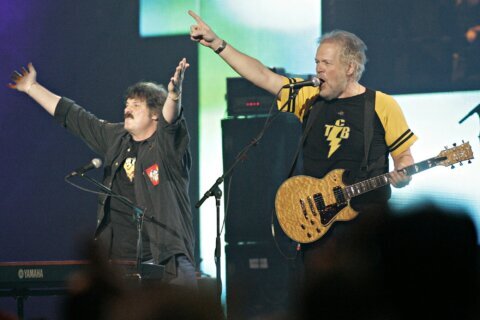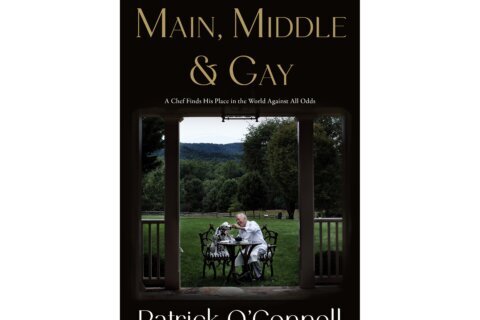Listen to our full conversation on WTOP’s “Beyond the Fame” podcast.
George Thorogood is one of the most successful artists to come out of the Chesapeake Bay region with catchy blues-rock hits by his band, The Delaware Destroyers.
This month, he rocks Wolf Trap on a bill with Joan Jett & The Blackhearts on Aug. 12.
“I wonder how cool she thinks it’ll be to share a stage with me?” Thorogood told WTOP. “I’m looking forward to it. I’ve never met the lady. … She’s quite a baseball fan, Baltimore Orioles fan. … It’s always a thrill to play with someone in the Rock & Roll Hall of Fame.”
Born in Wilmington, Delaware, in 1950, Thorogood loved music from a young age.
“I had two older brothers,” Thorogood said. “My older brother bought a lot of singles and records and had the radio on, so when rock ‘n roll hit about 1956, it hit our household. Elvis Presley was the biggest thing going. I did not know at this tender age that rock ‘n roll was something new. … Then came The Beatles, The Stones, so I got in on it at the very beginning of the party.”
He admits he was green in the beginning when he was first learning to play.
“I had been performing as a soloist for a while and I wasn’t much good at it,” Thorogood said. “I could handle the guitar pretty good and was getting great encouragement from artists like Sunny Terry, Robert Lockwood, Hound Dog Taylor. I had in the back of my mind to start a band someday.”
He finally got his chance during a trip home from Boston to Delaware.
“I went back to Delaware to see my sister get married,” Thorogood said. “There was a party and Jeff Simon picked up his drums, I picked up an electric guitar, we were just jamming and he really sparked the interest. He had a very unique quality of being able to follow me on the guitar.”
Soon after, Simon visited Thorogood in Boston to watch Hound Dog Taylor.
“I said, ‘Jeff, we’re going to start a band like those guys,'” Thorogood said. “He immediately quit his job, dropped out of college, bought a drum set, took his Volkswagen, filled it up with gas, got every eight-track tape he could of rock ‘n roll and blues, showed up at my house with all of that and a case of beer, knocked on the door and said, ‘Come on, let’s go!'”
Thus, the Delaware Destroyers were born in 1973, as Thorogood gained a reputation for his unique guitar style, playing with a finger pick and thumb pick rather than a typical flat pick.
“I was fortunate to see Brownie McGee, John Hammond and Fred McDowell, who played with their fingers like I do,” Thorogood said. “I had a heavy attack, my fingers were always bleeding, so I had to get these picks on my fingers, so it was more of an acoustic-blues style that I adapted to electric guitar like Freddie King. As Lockwood said, ‘You remind me of John Lee Hooker. You play right because you play wrong.'”
His debut album in 1977 covered Hooker’s “One Bourbon, One Scotch, One Beer.”
“I had an album called ‘John Lee Hooker: Live at the Cafe Au Go Go,’ backed up by the Muddy Waters Band,” Thorogood said. “When we went to see him play, I noticed that he did two sets and he did ‘One Bourbon, One Scotch, One Beer’ in both sets. … People were dancing, and 90% of the people dancing to that song were women, so I said, ‘Ah ha! Now we’re talking.'”
Two years later, McGee did a version that again packed the dance floor with women.
“I said, ‘Jeff, that’s the first song we’re going to learn,'” Thorogood said. “The women lead the way. After all, who discovered Elvis Presley? Women. Who discovered The Beatles? Women. So when I saw the chicks out there boogying to ‘One Bourbon, One Scotch, One Beer,’ I said, ‘That’s the first song we’re going to learn.’ We never thought much of it. … Luckily, it’s still going strong for us.”
He quickly developed a knack for covering other famous hits, from Hank Williams’ “Move It On Over” (1978) to Bo Diddley’s “Who Do You Love?” (1978), which regularly hit the FM airwaves.
“Rounder Records talked me into doing that song,” Thorogood said. “I didn’t really feel like doing it because so many people had covered it before that. … I said, ‘That song’s been done to death,’ and Rounder Records goes, ‘You only have seven songs on the record; you gotta do something.’ Who’s going to argue with the president of your record company? And again, it was a woman.”
He found his biggest hit with the hard-charging “Bad to the Bone” in 1982.
“In our neighborhood, the word was ‘bad,’ meaning groovy, meaning cool,” Thorogood said. “I always thought prepositional phrases worked really well, ‘Blowin’ in the Wind,’ ‘Gone with the Wind,’ and I said there’s a lot of words that rhyme with ‘bone.’ … I said, ‘The title is so juicy. If we don’t write a song called ‘Bad to the Bone,’ somebody else will, so it might as well be us.'”
How did he come up with the signature stutter “b-b-b-b-bad” in the chorus?
“The stuttering thing, when Roger Daltrey did that in 1965 with ‘talking about my g-g-g-generation,’ and then about 10 years later, [Bachman Turner Overdrive] said ‘b-b-b-baby you ain’t seen nothin’ yet,’ so I figured the market was right every 10 years to bring something like that into the song.”
He originally wanted Muddy Waters to recreate his blues riff, but it never happened.
“The Muddy Waters organization turned us down flat,” Thorogood said. “His manager said, ‘Muddy Waters will never cut a blues song written by a white guy.’ I said, ‘That is bullsh*t. If Eric Clapton or Keith Richards wrote a song, he’d record it in a minute, but I’m a nobody from Delaware.’ We took it to Bo Diddley, who liked the song but didn’t have a record deal, so we put Diddley in the video.”
His next album featured the hit “I Drink Alone” in 1985.
“We were trying to make a country song, I was very hung up on country music at the time, I was listening to a country station in L.A., and we wanted George Jones to do it,” Thorogood said. “The record company said, ‘We didn’t hire you to write songs for other people. We want you to do it.’ So we fooled around with it and came up with more of a Destroyers-type presentation.”
He found another hit in the next decade with “Get a Haircut” (1993), which was not only a hit in the U.S. but also Canada, Australia and New Zealand. While he’s gone global, Thorogood never forgot where he came from, continuing to tour the Delaware, Maryland and D.C. area.
There’s even a famous photo of him leaving a concert at the Cellar Door in Georgetown, still playing his guitar across the street to Desperado’s to switch places with The Nighthawks.
“That was something The Nighthawks cooked up,” Thorogood said. “They were working at Desperado’s across the street, we were working at Cellar Door. … In our club, all the Nighthawks’ girlfriends and wives were in our club watching me! That’s what was wrong with [Jimmy] Thackery, he was jealous about that! You see what I’m saying? We drew all of his women away from him.”
Both clubs no longer exist, but he’s happy that venues are reopening after a year and a half of pandemic shutdowns. How did Thorogood spend his time during COVID-19?
“I pretty much keep close to home,” Thorogood said. “I’m pretty much a homebody, to tell you the truth, so I caught up on a lot of things. I caught up on my guitar playing, I caught up on my exercising, a few other things, but nothing I wouldn’t normally be doing when I’m off the road.”
Listen to our full conversation on WTOP’s “Beyond the Fame” podcast.








